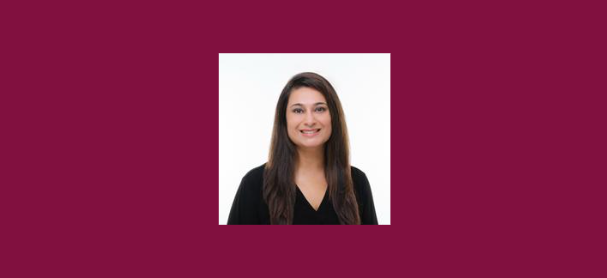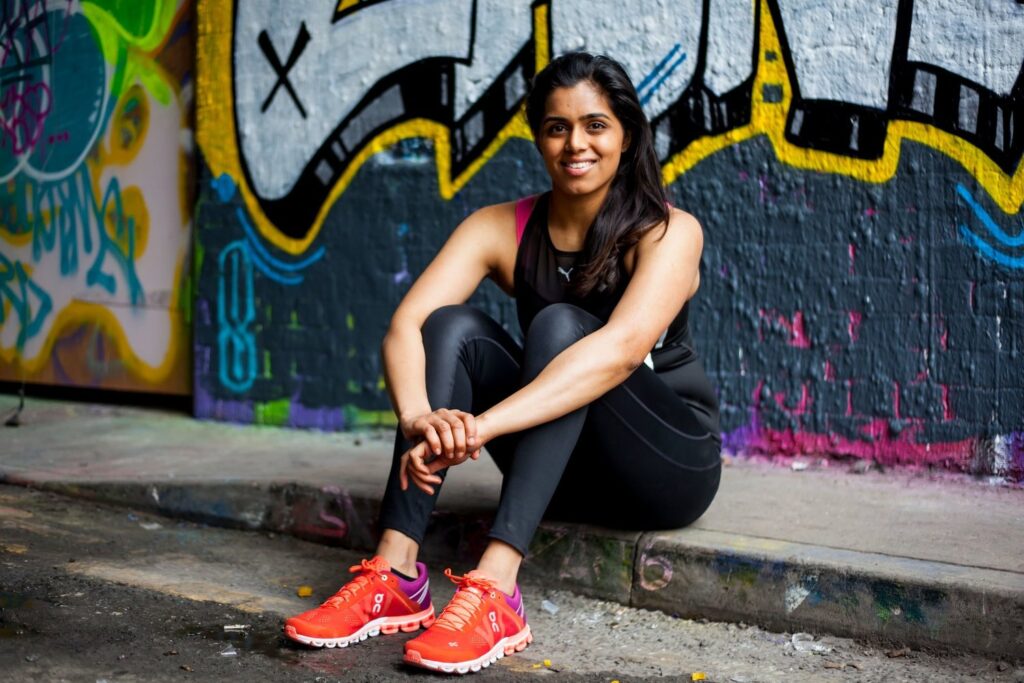
Note: This article was originally published on shakticollaborative.co. Some information may be dated given the original publish date.
Meet Mara Hafezi, endurance sports enthusiast who has competed in Ironmans, multi-stage desert ultras, ultra-duathlons and more. Mara is based in London and is a communications specialist by day and personal trainer on the side. She is also the author of the blog, The Fit Londoner, which encourages more people across all ethnicities to take part in sports and fitness and for brands in the fitness industry to be more colorful in their range of models. She shares with us her story of pushing herself to achieve new heights, increasing representation and diversity in the fitness ecosystem and being her true self. Read on to learn more!
The Beginning
“I grew up in London with my mom, dad and younger brother and sister. My dad immigrated to the UK from India when he was 13 and my mom was born here. We grew up in a very multicultural part of London, but went to schools where our peers were predominantly white. My siblings and I were quite aware of our differences. I went to an all girls school, which was very focused on promoting women and girls and told us that our gender should never be viewed as an obstacle.
My parents from a young age always encouraged us to be outdoorsy. I did a ton of activities from tap dancing to ballet to horse riding. We would go cycling on the weekends and we took swimming classes as well. As I grew older, I started thinking more about what I looked like and didn’t want to look too “boyish” despite my interest in athletics. As a result, I became more focused on academics and less focused on being active.
My first degree was in French history and my second in law. After university, I started a role in the communications field which was something I stumbled into. I have ended up loving communications because it enabled me to merge my creative side with my business / academic side. I’ve been very lucky that my parents have been really supportive. They never forced me to study bio or math and allowed me to study what I really enjoyed!”
Her Fitness Journey
“When my brother was applying to universities in the States,. he was focused on a bunch of extracurricular activities and started rowing and running marathons. Seeing all of that made me think, ‘wow, I’m not doing anything exciting like that in my spare time.’ It was so inspiring. So I started going out for short runs and then to the gym for a bit. I slowly built that up made it a consistent habit to work out. Every time I conquered a distance, it felt very exciting. I kept challenging myself to go further and further and fell in love with endurance training.
About two years ago after my fourth marathon, I decided I really wanted to do something out of my comfort zone. I decided to train for my first triathlon, which was an Ironman. I spent nine months training, and a lot of people told me I wouldn’t be able to do it. But nine months later, I did it and I loved it. That started my journey into competing in different types of endurance events.”
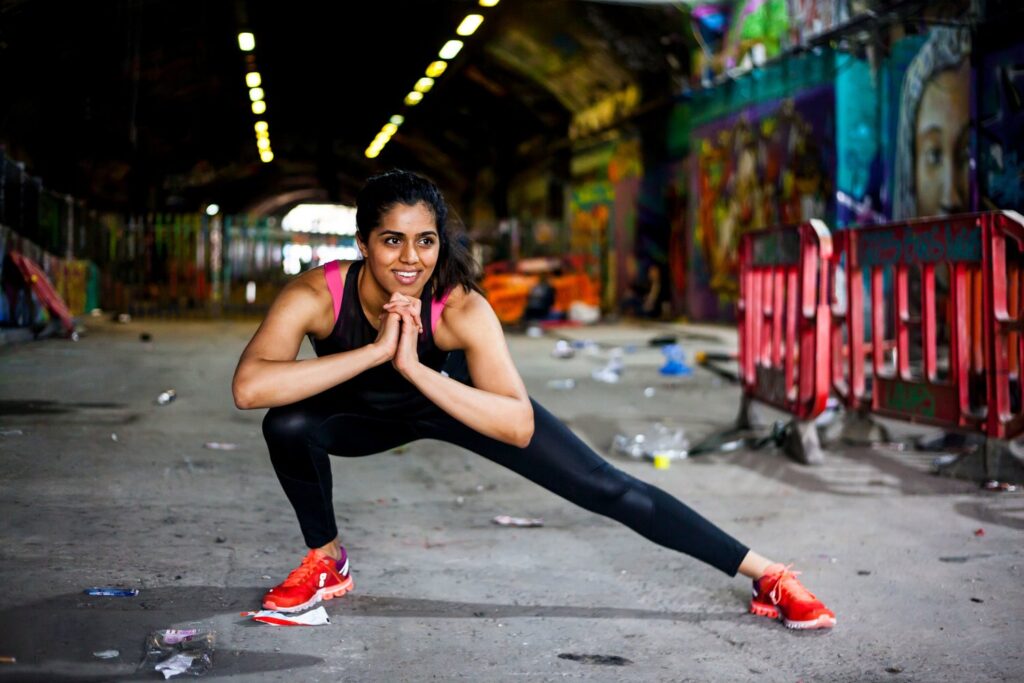
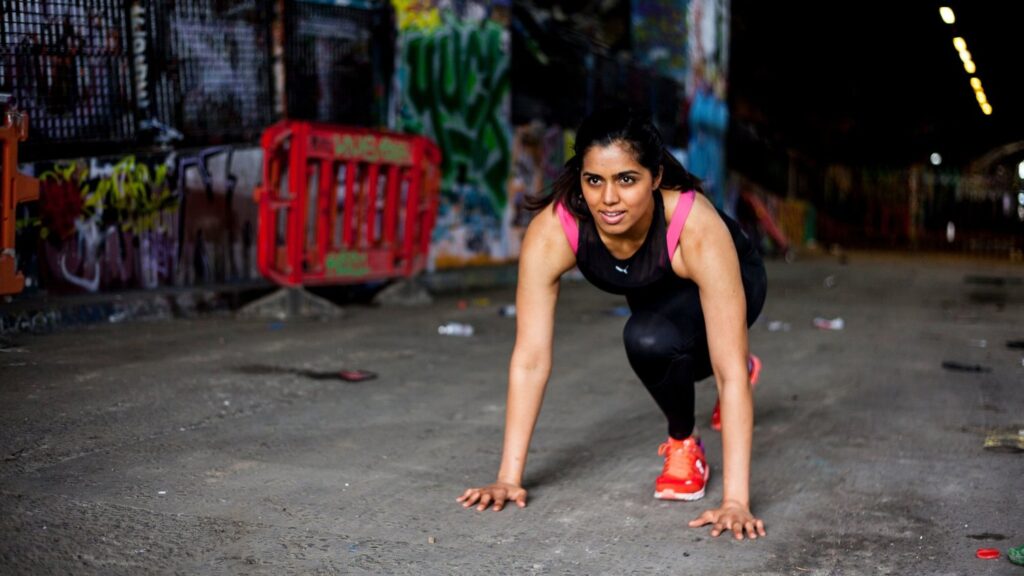
“I recently had an opportunity to take part in a multistage run in the Wadi Rum desert in Jordan. It was a 250 kilometer trek across five days – and it’s considered one of the toughest foot races on the earth. It was daunting, but I approached it with the mindset of you don’t know what something will be like until you try it. It was an incredible experience. I recently followed it up with a run from Los Angeles to Las Vegas – a 340 mile unsanctioned relay!
I also started a blog along this journey: The Fit Londoner. I started it to document the events I do and my thoughts on certain aspects of the fitness / health / wellness industry. Over time, I’ve also grown it to raise the profile of women of color in sporting and fitness. I highlight women of color who have completed significant sporting achievements, and it’s been fantastic to meet and inspire others through this platform. I want to see The Fit Londoner grow even more in terms of geographical reach and the type of women I hope I’m inspiring.”
Increasing Representation in the Fitness World
“As I think about my own family, I’ve observed that all my girl cousins were more focused on stereotypical girly things like makeup, rather than exercising. I do a lot of long distance sports today and I notice that the longer the distance, the fewer women of color there are as well. In England, it is starting to get a little bit better, but we still have a long way to go.
The health and wellness industry is very white centric. There have been a lot of campaigns in the UK that aim to encourage women to get more active, but they’ve predominantly used white models. There are large segments of ethnicities that are not part of the conversation. I’m now seeing a lot of those campaigns becoming more and more diverse. I think that’s very important, because if you see someone you can relate to, then that can help you achieve your goals. For example it’s great that Nike has now got a campaign where they have included Ibthihaj Muhammad wearing a headscarf. That is so important and goes a long way in promoting role models for everyone.”

“This past February, I was lucky to be featured on the front cover of the Women’s Running Magazine in the UK. I don’t know if I’m the first, but I’m definitely one of the few Asian women on the front cover of that magazine. That’s a massive step for us. In the UK, you barely see any women of color on the front cover of any sports magazine. When they offered me the front cover, I told them I didn’t want to just be a check off the list for diversity. I want them to continue to feature other women of color on the front covers.
Part of the reason why I’m so motivated to compete at this level is because I want to encourage women from different ethnicities and show them that they too can take part in exercise and sports and challenge themselves in whatever they want to do. It can be any distance, any event, and any sport, and they too can feel a part of the fitness community. I want to help more women take up challenges outside of their comfort zone – any mountain, physically or mentally.”
On Body Image
“As I’ve spent more time in the fitness ecosystem, I’ve also chosen to focus less on the aesthetics side of how I look and more on achieving my goals. It’s great to celebrate the work you’ve put in to look a certain way, but I think it’s important to highlight performance rather than just body image. If you’re able to set goals and then work towards achieving them, it’s a lot more healthy of a mindset. I’m encouraging brands to think in this way too so we don’t perpetuate unrealistic expectations.
I went through a period a couple of years ago where I was counting my calories every day. I don’t do that anymore. I am still quite careful in terms of what I eat – I don’t really eat fried food, but I do like a little bit of dark chocolate, so I make sure there is room for that in my life! I don’t cut out any food groups and focus on eating in moderation. I still have a lot of days where I look at myself in the mirror and don’t like what I see, but I think about what I’m trying to stand for and communicate.”
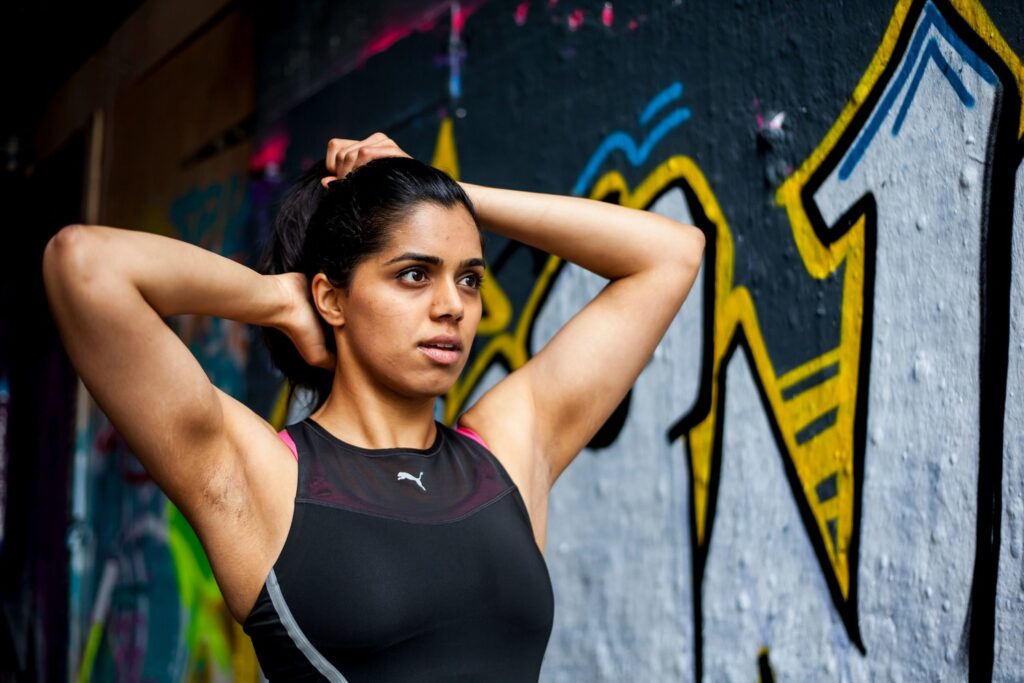
“Body image can definitely be challenging in the South Asian community. Whenever I go to Indian weddings or see family, I am hyper-aware of my body. I’m considered very tall for an Indian girl and everyone else is a lot shorter and skinnier than me. So I’ll get comments like ‘you look a bit big.’ Or when I go to wedding shops to get an outfit, I don’t fit into most of the clothes because I’m too long, so I have to get most of my clothes made by a tailor. It’s crazy that this still happens, but I try to own it and encourage others to change their mindset around what’s considered ‘normal.’
I also think our experience with health and body image starts at home. We need to make sure that families are staying active together and going outdoors. Go outside and explore a local area. Walks themselves are a form of exercise. In terms of food, we should be creative with food. When I was younger, my mom used to have us cook with her. She would be creative and help us try out different food and find ways to eat healthy. It’s also important to encourage each other to step outside of our comfort zones. For example, my mom was very nervous when she first started cycling to work. She didn’t want everyone to watch her and comment on why she was on her bike or how she looked. But we helped her get through those first few weeks, and she now really enjoys it and loves it.”
On Love and Family
“I’m quite lucky, because my parents are very liberal and are not pushing me to get married. At the end of the day, they are aware that I’m quite happy being single and independent, but at the same time, they don’t want me to be on my own and come back to a cold home. But they forget that you can get an app that turns on the heating for you before you get home (hah)!
I definitely face some pressure from family friends and extended family. My mom even tells me to go on Bumble or the latest apps to find a guy on my own. I’m like ‘mom, I know you’re cool, but you don’t have to be that cool!’ I will say that being tall has its advantages sometimes – whenever my parents get expressions of interest from other people, they’ll always mention the guy’s height. And because I’m 5’9’’, most boys are shorter than me and that’s an easy way to end the dialogue right there!
In all seriousness, I think parents should be supportive of their daughters’ interests in terms of sexuality and independence. For me, my independence is so important. I know the right person will turn up at the right time. People have got to understand that there are certain pockets of our culture that are still a little bit backwards and not forward thinking. They have certain opinions around what girls should be like. We’ve got to be more open with each other across all aspects of our lives, and understand that things will be different as most of us grew up differently than our parents.”
On Mental Health and Self-Care
“I’ve learned how important mental strength can be. When I’m in the toughest parts of a race, I try to connect back with the reason why I’m even there. I’m here for a reason, so I can’t stop now.”
“It can be challenging to juggle work, training and life all together, but I remind myself that I really enjoy it all and that I’ve set specific goals to achieve. Visualizing myself achieving those goals really helps me stay energized. I’ve learned how important mental strength can be. When I’m in the toughest parts of a race, I try to connect back with the reason why I’m even there. I’m here for a reason, so I can’t stop now.
It’s also really important to have a strong support network in all aspects of your life, whether that’s friends or family. This has been especially important for me given that my work and fitness worlds are so different and pose different challenges. It wasn’t easy in the beginning to be super open with my friends and family about my fitness goals, but once I started speaking about it, everyone was very curious and wanted to understand and support me.
I also try to stick to a consistent morning and evening routine. In the morning, I have the radio on and go through my morning cleansing and skincare regimen. I’ll then have oats with bananas and peanut butter, and maybe even some chocolate if I’m feeling extravagant. Depending on the day, I either go out for a swim, cycle or run (I’m currently training for a triathlon) or Crossfit session. And then I’m off to work! In the evening, I have a hot drink (hot milk with haldi) before going to bed. It helps me sleep like a baby and I feel so good the next day!”
Just for Fun
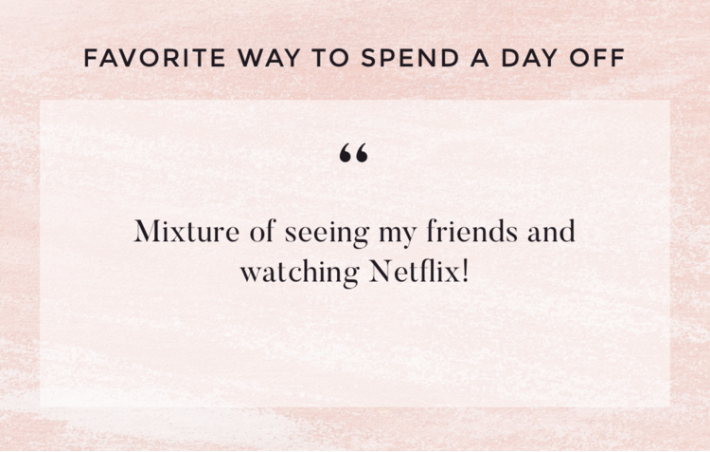
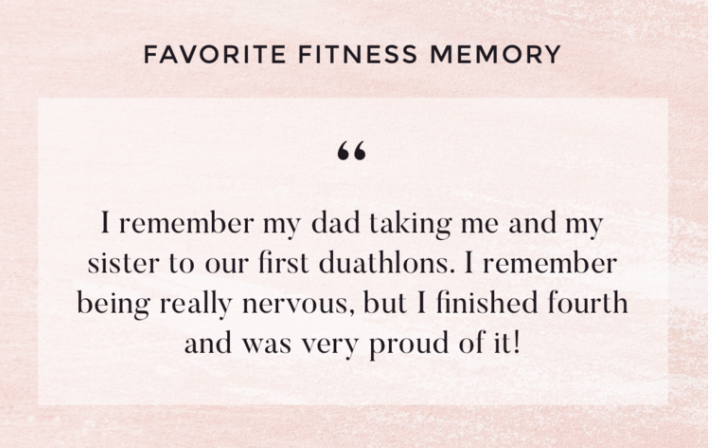
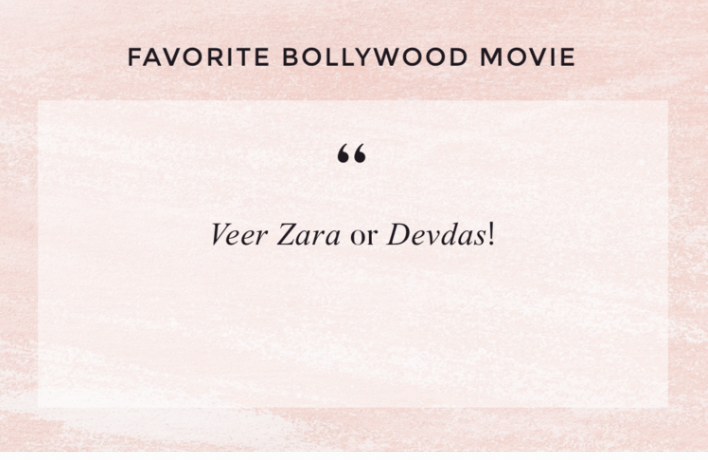
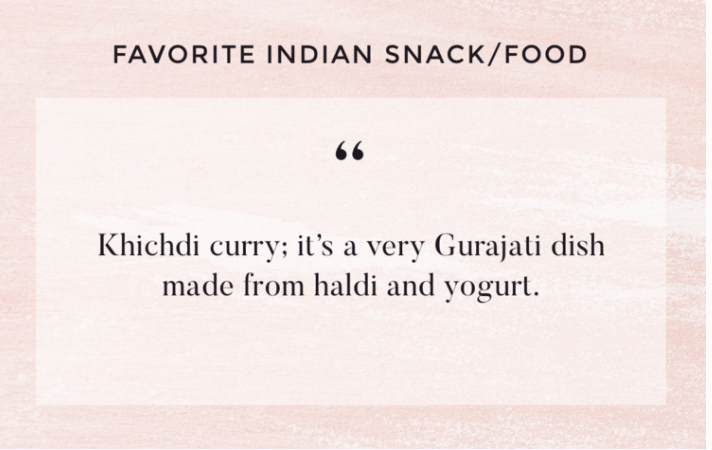
***************
Author Bio:
Shakti Collaborative illuminates narratives of strength, choice, and culture in the South Asian community.



